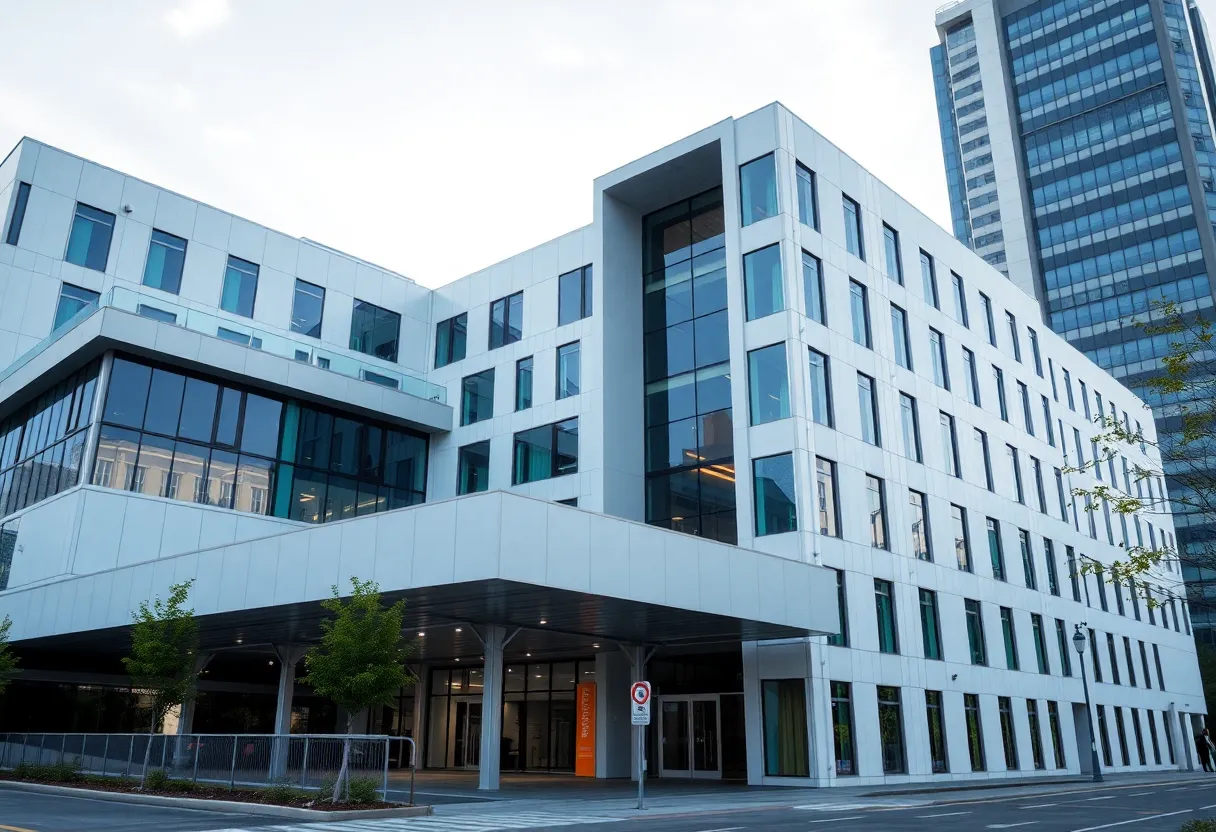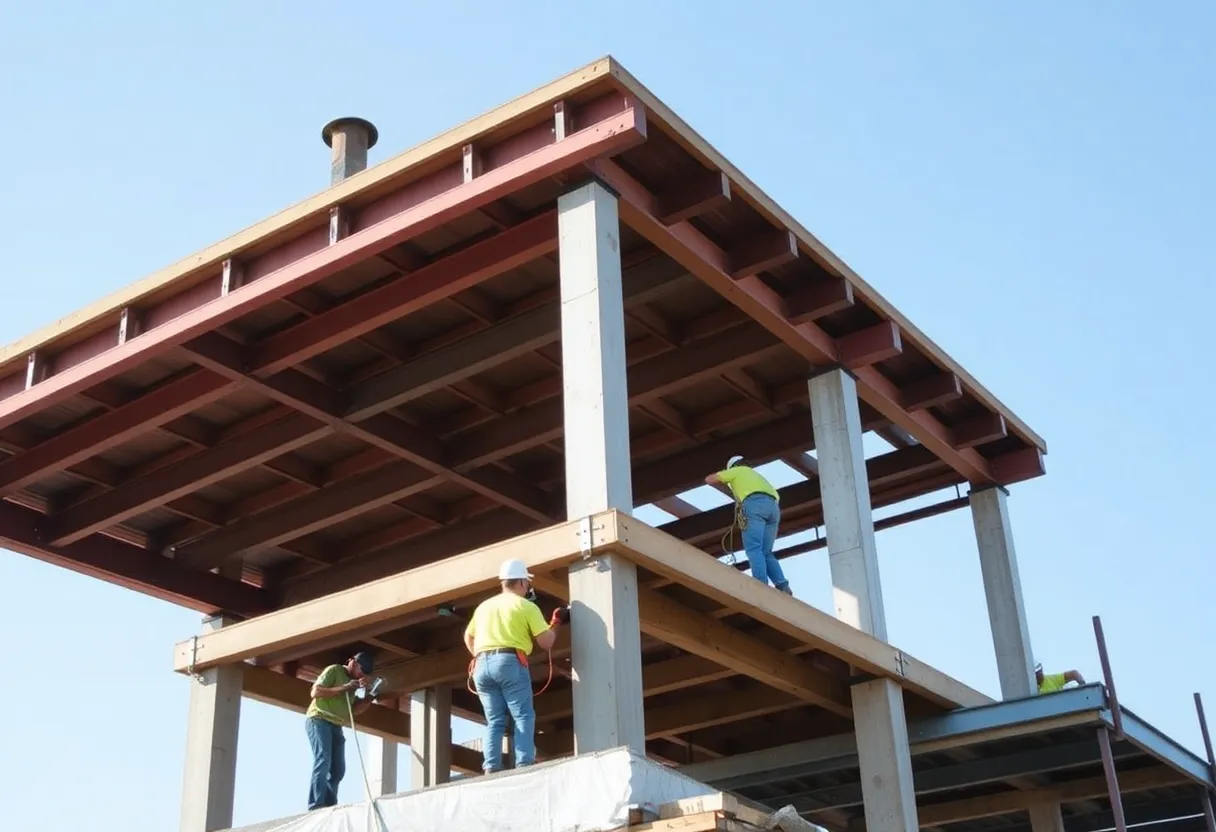News Summary
A new hospital in Orlando, Florida, is leading a nationwide shift in healthcare construction by utilizing prefabricated methods, cutting build times by 40%. The state-of-the-art cancer center is set to open ahead of schedule, addressing urgent medical needs efficiently and sustainably. This innovative approach not only decreases costs through reduced labor and waste but also supports the growing demand for advanced healthcare facilities, particularly for geriatric care. As prefabricated construction gains traction, it promises to transform the healthcare infrastructure landscape across the nation.
Orlando, Florida Leads Nationwide Shift in Prefabricated Construction for Healthcare
In Orlando, Florida, a new hospital has utilized prefabricated construction methods to revolutionize healthcare facilities nationwide. This approach, involving modular panels for rapid assembly, has significantly reduced build times by 40%, enabling the delivery of a state-of-the-art cancer center ahead of schedule in October 2025.
The project highlights the efficiency of prefabricated construction, which allowed for faster completion compared to traditional methods. By assembling components off-site and integrating them quickly on location, the hospital was constructed more swiftly, addressing the growing need for advanced medical facilities. This method not only accelerates timelines but also contributes to cost savings and enhanced sustainability in the construction process.
Supporting details reveal that prefabricated construction plays a key role in reducing overall project expenses through minimized on-site labor and material waste. The cancer center in Orlando exemplifies how these savings can be achieved while maintaining high standards of quality and innovation. Additionally, the technique promotes environmental benefits by using materials more efficiently, which aligns with broader efforts to make healthcare infrastructure more eco-friendly.
Beyond the immediate project, prefabricated construction is becoming a nationwide trend in healthcare, facilitating quicker access to advanced treatments for patients. This is particularly important amid the rising demand for geriatric care, as an aging population requires expanded medical services. The approach ensures that facilities like the Orlando cancer center can open sooner, helping to meet these healthcare demands more effectively.
The background of this development stems from ongoing advancements in construction technology. Prefabricated construction involves pre-building sections of a structure in a controlled environment, which reduces weather-related delays and improves precision. In the context of healthcare, this method has gained traction because it allows for the rapid expansion of facilities to handle increasing patient loads, especially for specialized care like cancer treatment. Experts note that these innovations are helping to transform the industry by making projects more efficient and responsive to public health needs.
Overall, the Orlando project serves as a model for how prefabricated construction can streamline healthcare development across the nation. By cutting build times and incorporating sustainable practices, it demonstrates practical benefits that could influence future infrastructure projects, ensuring that communities have access to modern medical resources without unnecessary delays.
This nationwide application of prefabricated construction in healthcare underscores its potential to address systemic challenges, such as long wait times for facility upgrades. The 40% reduction in build time for the Orlando cancer center illustrates a tangible impact, potentially setting a precedent for other regions to adopt similar strategies. As demand for geriatric care continues to rise, these methods could play a crucial role in expanding capacity and improving patient outcomes.
In summary, the success of this project in Orlando highlights the broader advantages of prefabricated construction, including economic efficiencies and environmental gains. It represents a step forward in adapting construction practices to meet the evolving needs of healthcare nationwide, paving the way for more resilient and timely infrastructure developments.
To provide more context, prefabricated construction involves designing and manufacturing building components in a factory setting, which are then transported and assembled on-site. This process has been refined over years to ensure that structures like hospitals meet strict regulatory and safety standards. In Orlando’s case, the focus on a cancer center addresses a critical area of healthcare, where timely access to treatment can significantly affect patient recovery rates. The nationwide scope of this trend indicates that similar projects are being considered or implemented in various states, driven by the need for cost-effective and sustainable solutions. By prioritizing these methods, the construction industry is contributing to a more efficient healthcare system overall, helping to alleviate pressures from population growth and aging demographics.
As healthcare demands evolve, the integration of prefabricated construction offers a scalable solution that balances speed, cost, and quality. This project’s completion ahead of schedule in October 2025 exemplifies how innovative techniques can overcome traditional barriers, making it a noteworthy development in the field.
FAQ Section
- Q: What is prefabricated construction?
A: Prefabricated construction is revolutionizing healthcare facilities nationwide, with a new hospital in Orlando, Florida, using modular panels for rapid assembly. - Q: How has prefabricated construction impacted the Orlando hospital project?
A: This method cut build time by 40%, delivering a state-of-the-art cancer center ahead of schedule in October 2025. - Q: What benefits does prefabricated construction offer according to experts?
A: Experts from firms like Modern Healthcare report prefab’s role in cost savings and sustainability, enabling quicker patient access to advanced treatments amid rising demand for geriatric care. - Q: Why is prefabricated construction important for healthcare nationwide?
A: It is revolutionizing healthcare facilities nationwide by enabling quicker patient access to advanced treatments amid rising demand for geriatric care.
Key Features Chart
| Feature | Description | Benefits |
|---|---|---|
| Modular Panels | Pre-built components assembled on-site | Rapid assembly, reducing build time by 40% |
| Cost Savings | Efficient use of materials and labor | Lowers overall project expenses |
| Sustainability | Minimized waste and eco-friendly practices | Supports environmental goals in construction |
| Quicker Access | Faster completion of facilities | Enables quicker patient access to advanced treatments |
Deeper Dive: News & Info About This Topic
Construction FL Resources
Memphis Medical Center Expansion Announced
Global architectural services market set to nearly double as digital tools and sustainability drive demand
Modular construction ramps up as integrated firms earn higher margins
Saudi prefabricated building and structural steel market primed for growth
Modular Wall Panel Systems Market Poised for Growth
Author: Construction FL News
The FLORIDA STAFF WRITER represents the experienced team at constructionflnews.com, your go-to source for actionable local news and information in Florida and beyond. Specializing in "news you can use," we cover essential topics like product reviews for personal and business needs, local business directories, politics, real estate trends, neighborhood insights, and state news affecting the area—with deep expertise drawn from years of dedicated reporting and strong community input, including local press releases and business updates. We deliver top reporting on high-value events such as the Florida Build Expo, major infrastructure projects, and advancements in construction technology showcases. Our coverage extends to key organizations like the Associated Builders and Contractors of Florida and the Florida Home Builders Association, plus leading businesses in construction and legal services that power the local economy such as CMiC Global and Shutts & Bowen LLP. As part of the broader network, including constructioncanews.com, constructionnynews.com, and constructiontxnews.com, we provide comprehensive, credible insights into the dynamic construction landscape across multiple states.





